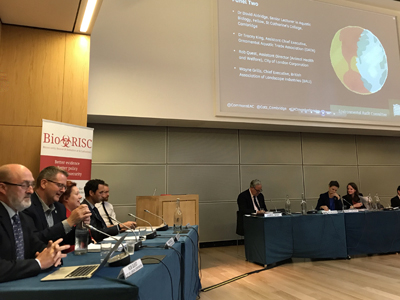Submitted by Rachel Aucott on Tue, 11/06/2019 - 15:57
The Environmental Audit Committee met in St Catharine’s College Cambridge yesterday (11th June 2019) to take evidence on the threat to the UK and UK Overseas Territories from invasive species. The committee, chaired by Mary Creagh, MP for Wakefield, questioned leading experts in this field on the best ways to manage or prevent invasive species from destroying native ecosystems with the UK and UK Overseas Territories.
One panel of witnesses had a direct UK focus and included the Department’s own Aquatic Ecology expert, Dr David Aldridge. David provided evidence on several invasive species that were having a severely detrimental effect on native UK freshwater species, in particular, the Killer Shrimp and the Quagga Mussel. David pointed out that the “Check. Clean. Dry.” campaign at many water sport facilities had been successful but still needed work for it to be more effective.
David Aldridge also highlighted a horizon scan, he had done five years ago in 2014. This horizon scan looked at the potential invasive species that might threaten biodiversity in the UK in the future, and how by using evidence and knowledge from other conservation practitioners the threat could be managed. The group identified a top 10 invaders we least wanted in the UK, and 5 years later 8 out of 10 of these threats had materialised in the UK. David pointed out that while this proved the UK was good at horizon scanning, it was less good at implementing any management actions. This was, he believed, due to lack of leadership and funding.
Another panel provided evidence with particular emphasis on UK Overseas Territories, including the Antarctic, the Falkland Islands, Ascension Islands and islands in the Caribbean. Dr Kevin Hughes, the Environmental Research and Monitoring Manager at British Antarctic Survey, provided clear-cut evidence to show that when strict biosecurity measures were in place the threat of invasive species establishing a hold in a non-native environment dramatically lessened. This had not been achieved easily or cheaply but he urged the government and other organisations to provide for biosecurity regulation within their budgets.
When asked what lessons had been learnt the first panel agreed that biosecurity measures along the length of the supply chain should be implemented, knowledge should be shared across all the stakeholders and that people on the ground were the essential element in maintaining vigilance against potential invasive threats.
The Select Committee was invited to come to Cambridge by St Catharine’s BioRISC Initiative, largely led by Professor Bill Sutherland and Dr David Aldridge. BioRISC focusses on biosecurity in a broad sense, extending across its uses in the fields of conservation and environmental protection, protection of human, animal and plant health against naturally occurring biological threats, and accidental releases of unintended consequences from novel organisms.
You can watch the proceedings on the House of Commons Committees' YouTube Channel.

